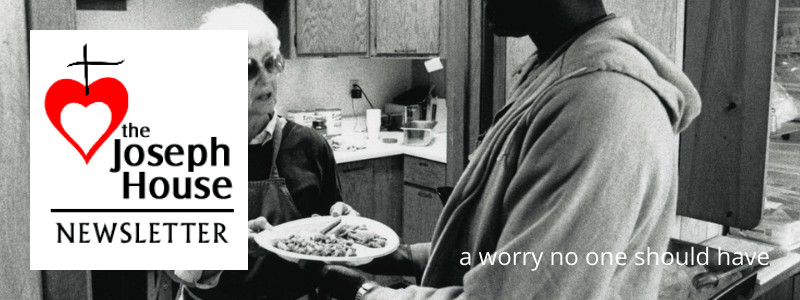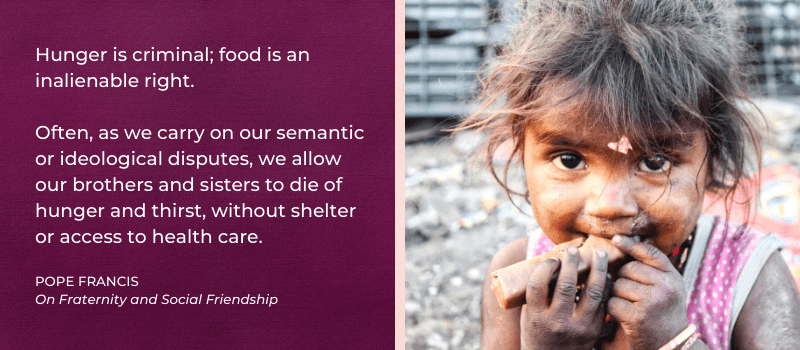Newsletter: July 2021

Dear Friends of Joseph House:
Like many people probably are, we are very familiar with our local grocery store. We know where everything is, and whether we are making a quick trip or shopping for a large order, we can usually find what we need. Even throughout this past year, shortages were never that bad. It’s been a real comfort knowing that our store is nearby. We are extremely grateful for the store’s employees, who, along with all front-line workers, made a sacrifice for the good of others. This gets to the heart of what makes us human, of being the kind of people God had in mind when He made us “a little less than the angels, crowned with glory and honor” (Psalm 8:6). Sometimes it takes extraordinary circumstances to understand the significance of ordinary activities.
Going to the grocery store and having a steady supply of food can easily be taken for granted. As a friend of Joseph House, you know there are many people who can’t take anything for granted, even just having enough food for themselves and their children. The fact that people in this land of abundance go hungry is beyond tragic. But with your help, our ministry works to alleviate this unnecessary suffering.
Although our Soup Kitchen has been closed as a safety precaution, our Food Pantry has remained open during the pandemic. Your donations of food allow us to serve hundreds of households each month. Your financial support covers the minimal overhead required to keep our freezers in operation and our trucks filled with gas. Maybe you know what it’s like to go to bed hungry. Maybe family members told you stories of hard times they endured. You can help people going through hard times today through your continued support of Joseph House. Because no one should have to worry about getting his or her next meal.
It is cruel and unjust that many people who work hard to produce the food we eat have to struggle to obtain their own basic necessities. Consider Selina, who came to our area from Georgia with other migrant workers to pick watermelons. She somehow got left behind when her group moved on to another state to pick potatoes. Selina gets paid about $30 at the end of each day, barely enough to cover her room rent. Two days of heavy rains meant no work and empty pockets for her. The people she knew were gone and so she had nowhere to go. We provided two nights in a motel ($112). After that, Selina was back in the fields.
Some might say her pay is justified given that it’s unskilled labor, but such a thing does not exist. Since we are not likely to grow and harvest our own crops, we would starve without people like Selina. What is the value of their work? A living wage at the very least.

As our nation—though not the whole world—emerges from the worst of the pandemic, many people feel relief that life is returning to normal. But for the poor, “normal” brings no relief at all.
Deidre, 59, is caring for her husband who has terminal cancer. She is also working full-time. She sent the electric company $200, but still received a termination notice. The Joseph House paid $350 to keep the power on in this couple’s home.
Nadine, 60, is raising her five grandchildren. Their mother is in jail and the father has disappeared. Nadine was working nights at a hospital doing cleaning. One grandchild had to go to a Baltimore hospital because of brain damage. After returning home, the child’s need for additional care meant Nadine could no longer work at her job. Her monthly income dropped to $700. The Joseph House paid $400 toward her back rent to prevent eviction proceedings. We also bought $90 worth of prescription medications for her grandchild.
Paula, 42, is rebuilding her life after spending 6½ years in prison. Her lack of transportation limits her prospects for employment. A housekeeping job at a motel seemed promising because she could also live there; it became a losing proposition, however, because the motel bill was greater than her paycheck! Another agency agreed to help Paula with affordable housing. In the meantime, we didn’t want her to be homeless so we sent $350 to the motel.
A few months ago, Melanie, 22, took unpaid leave from her job at a chicken plant when her infant son became sick. She ended up losing her job, but found a new one as a cashier. Melanie paid off her delinquent electric bill (almost $800) to stop a cut-off. Then she had no money for her rent and received an eviction notice. We sent $300 to her landlord.
Mateo, 20, also took time off from work to care for his sick child (he has custody). He lost his job and was going to lose his subsidized housing before starting new employment. We paid $320 toward the past-due rent.
After a fire destroyed their rental home, Rich and Danielle were homeless. The Red Cross paid for a few days at a motel and then referred the couple to us. Rich is disabled with an inoperable tumor on his back; Danielle is his caretaker. Their income is $800 per month. We paid for lodging ($280) until they could move into a new home.
Tasha, 26, is pregnant and has two other children. She fled an abusive relationship and moved into an apartment with her savings. Working as a babysitter brought in $450, not enough for the next rent payment. We paid the landlord $350 so this little family would not be evicted. Tasha is determined to find another job.
Thank you for your support of our mission. We must guard against taking people for granted, especially those who live and work in the margins.
Last month we wrote about the importance of prayer in our lives. It’s helpful to pray throughout the day, and a good habit is to offer a short prayer of gratitude before eating. Even if it’s just a snack, food is life, given from the goodness of creation and the work of human hands.
Every day we offer a prayer of gratitude for you. May you and your loved ones enjoy a happy and healthy summer. Thanks for reading our Newsletter. You have no idea how much we appreciate you!
Your Little Sisters of Jesus and Mary
You can join us in reaching out to others by making a donation: Donate.
Please send us your special prayer requests: Contact Form.
Read a little more about food justice here: Those Who Give Us Our Daily Bread.
